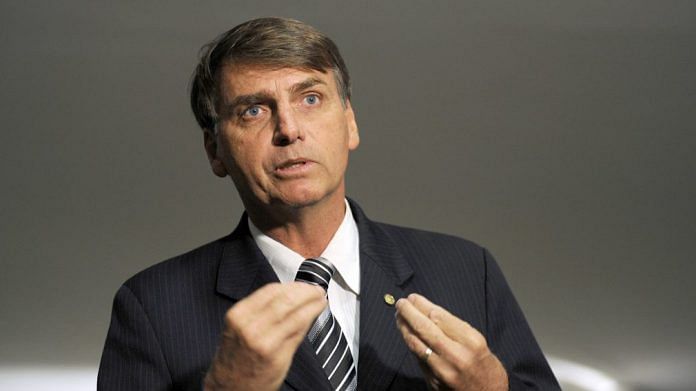Only Mexico, right next to Donald Trump’s America, has refused to fall in line as it elected Left-leaning Lopez Obrador in July.
New Delhi: Jair Bolsonaro’s victory in the Brazilian presidential polls further entrenches the Right-wing shift Latin America has made in the past couple of years. In fact, out of the top six Latin American economies measured in terms of nominal GDP (excluding Venezuela whose latest figures are not available), five — Brazil, Argentina, Colombia, Chile and Peru — have now elected a Right or Centre-Right party in the past two-three years.
Only Mexico, the second largest regional economy after Brazil and right next door to Donald Trump’s America, remains an exception, as it elected Left-leaning Lopez Obrador in July.
The reasons for what has been described as Trumpification of Latin America range from a slowdown in economic growth marked by falling commodity exports to cases of corruption that engulfed previous governments.
Rise and fall of the Latin American Left
Hugo Chavez’s 1999 victory in Venezuela ushered in the so-called Pink Tide (a term denoting Left-wing, non-Communist governments) in Latin American politics. In Brazil, the Workers’ Party came to power in 2002 and governed it for 14 years, first under the party’s founder Lula da Silva, and then under his protege Dilma Rousseff.
Similarly, Left-wing leaders such as Cristina Fernandez in Argentina and Michelle Bachelet in Chile were elected to power in other parts of Latin America.
Most of these governments have now been ousted. In Brazil, Rousseff was impeached in 2016 after allegations of corruption surfaced against her. Her predecessor Lula was also sentenced to 12 years in prison for allegedly accepting bribes while in office.
The commodity export boom which had supported Brazilian growth and government’s welfare policies in the first decade of this century also receded after 2012. This has hit the Brazilian economy hard, so much so that its GDP has declined from $2.465 trillion in 2012 to $2.056 trillion in 2017.
Also read: Deep in debt, Videocon blames Modi’s India, Supreme Court and Brazil
Amid these happenings, the country has moved towards the Right by electing a man (Bolsonaro) who has lauded the use of torture under Brazil’s military dictatorship and called Haitian refugees carriers of disease to Brazil.
A similar story exists in other countries. In Argentina, Fernandez was accused of accepting bribes from construction companies in exchange for public works contracts in 2015. In the elections held that year, Argentina took a Right-ward turn after 12 years of Left rule by electing Centre-Right candidate Mauricio Macri in its presidential election.
In Chile, the country elected Right-wing Sebastian Pinera over his Left-wing rival last year. While he had also assumed power during the 2010-2014 period, Chilean politics in the past two decades has mostly been marked by dominance of its Centre-Left party. Incidentally, former President Bachelet has been embroiled in a corruption scandal involving her daughter-in-law.
In Colombia, a country with a history of choosing a Right-wing government, the trend continued with Ivan Duque’s victory. Even in Peru, current President Martin Vizcarra comes from a Centre-Right party.
Also read: Japanese princess marries a commoner and right-wing Bolsonaro is Brazil president
The Mexican outlier
This Right-ward shift, however, was stalled in Mexico earlier this year when it elected Obrador as President. Fighting on an anti-corruption plank, Obrador doesn’t belong to any of Mexico’s two traditional political parties — PRI or PAN.
Institutional Revolutionary Party (PRI) has dominated Mexican politics since 1929, and its hegemony was only broken in 2000 when conservative National Action Party (PAN) ousted it from power. PRI again captured power in 2012.
Obrador, an outsider representing change, can perhaps cannot only address the problem of corruption but also revive Mexican economy whose GDP fell from $1.31 trillion in 2014 to $1.15 trillion in 2017.



